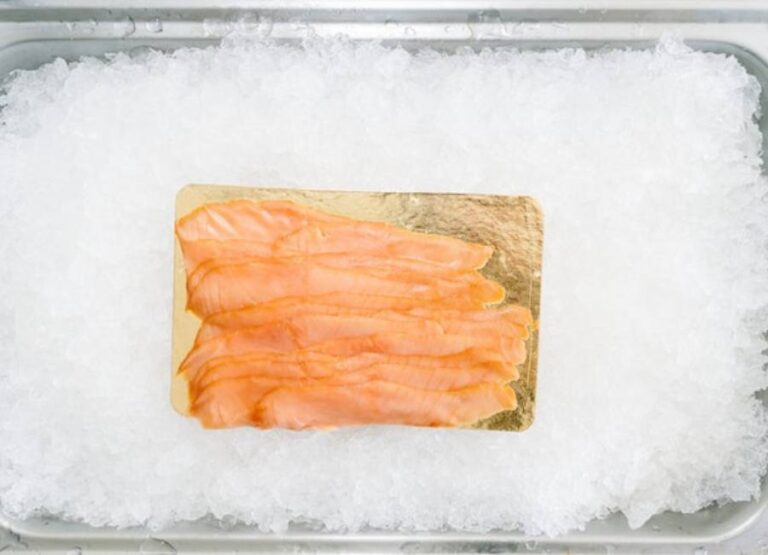Can Pregnant Women Eat Canned Tuna [Answered]
Pregnancy can be a great time to try new foods and explore different flavors, but when it comes to seafood, many pregnant women are understandably hesitant.
There are concerns about mercury levels and food safety, which can make it difficult to know what to eat and what to avoid.
One question that often comes up is whether pregnant women can eat canned tuna.
In this blog post, we’ll take a closer look at this popular seafood item and provide some helpful tips for expecting mothers.
So, can pregnant women eat canned tuna? Let’s find out!
Can Pregnant Women Eat Canned Tuna
Yes, pregnant women can eat canned tuna, but it’s important to do so in moderation and choose the right type of tuna.
Canned light tuna is generally considered safe for pregnant women to eat, but they should limit their intake to no more than 2-3 servings (6 ounces) per week.
However, pregnant women should avoid consuming canned white (albacore) tuna in large amounts because it contains higher levels of mercury than canned light tuna.
They should also avoid eating other types of high-mercury fish, such as shark, swordfish, king mackerel, and tilefish, as these can be harmful to the developing fetus.
There is some variation in the recommendations regarding eating canned tuna during pregnancy.
The US FDA advises pregnant women to limit their consumption of canned tuna to 2–3 servings per week and to choose canned light tuna, which is lower in mercury than some other types of tuna.
The American Pregnancy Association recommends that pregnant women avoid canned tuna due to its mercury level.
Consumer Reports recommends that pregnant women avoid canned tuna altogether, as some cans may contain much higher levels of mercury than others.
It is advisable for pregnant women to consult their healthcare provider regarding their individual needs and risks.
Precautions to take when consuming canned tuna during pregnancy
As a pregnant woman, it is important to take precautions when eating canned tuna to ensure the safety and well-being of both yourself and your growing baby.
Here are some precautions to take when consuming canned tuna during pregnancy:
- Limit overall fish intake: Pregnant women are advised to limit their overall fish intake to 8 to 12 ounces per week, due to the risk of exposure to environmental toxins, such as mercury.
- Choose lower mercury options: When selecting canned tuna, choose varieties that are lower in mercury, such as light canned tuna. Avoid larger fish, such as albacore, which may contain higher amounts of mercury.
- Read labels carefully: Look for labeling that indicates the type and size of the fish used, as well as information on mercury levels.
- Check expiration dates: Be sure to check the expiration date on canned tuna and avoid consuming any that are expired.
- Proper storage: Store canned tuna at a temperature of 40°F or below to prevent the growth of harmful bacteria.
- Avoid raw or undercooked tuna: Pregnant women should avoid consuming raw or undercooked tuna to reduce the risk of foodborne illnesses, such as Listeria or Salmonella.
- Avoid smoked, pickled, or jerky-style tuna: These types of canned tuna may contain higher levels of sodium and other preservatives that can be harmful to pregnancy.
- Rinse canned tuna before consuming: Rinse canned tuna with water before consuming to reduce the amount of sodium it contains.
- Consult with a healthcare provider: Always consult with a healthcare provider prior to making any significant dietary changes during pregnancy and follow their advice and recommendations.
Learn more about eating raw tuna when pregnant.
Benefits of Consuming Canned Tuna During Pregnancy
Here are some potential benefits of consuming canned tuna during pregnancy:
- Omega-3 Fatty Acids: Canned tuna is a good source of omega-3 fatty acids, which are important for fetal brain and eye development.
- Protein: Canned tuna is also a good source of protein, which is important for building and repairing fetal tissue.
- Iron: Tuna is also a good source of iron, which is important for both fetal and maternal health during pregnancy.
- Potassium: Canned tuna is a good source of potassium, which can help to regulate blood pressure during pregnancy.
- Vitamin B12: Tuna is a good source of vitamin B12, which is important for making DNA and red blood cells.
- Vitamin D: Canned tuna is a good source of vitamin D, which is important for bone health and immune function.
- Niacin: Tuna is a good source of niacin, which is important for promoting healthy digestion and skin.
- Low in Fat: Canned tuna is generally low in fat, which can help to control weight gain during pregnancy.
- Convenient: Canned tuna is easy to prepare and a convenient source of protein, making it a great option for busy pregnant women.
It’s important to note that while canned tuna can provide many of these benefits, it’s recommended that pregnant women consume no more than 6 ounces of canned tuna per week due to the potential risk of mercury exposure.
Learn more about eating ahi tuna when pregnant.
Risks Associated with Consuming Canned Tuna During Pregnancy
While canned tuna is generally considered safe for consumption during pregnancy, there are some risks associated with consuming it in large quantities.
Here are some common risks:
- Mercury: Tuna is an oily fish that contains high levels of mercury which can harm the developing fetus nervous system even at low levels. It is recommended by the FDA to limit consumption of canned tuna to two to three 2-4 oz servings per week.
- Intestinal parasites: Pregnant women are more susceptible to contracting intestinal parasites such as tapeworms, which can be found in certain types of fish. This can result in abdominal pain, nausea, and diarrhea.
- Bacterial infections: Raw or undercooked fish can harbor bacteria such as listeria and salmonella, which can cause severe food poisoning and have adverse effects on fetal health.
- Allergic reactions: Some women may have an allergic reaction to tuna and other types of seafood, which can cause skin rashes, facial swelling, and difficulty breathing.
- High sodium content: Consuming too much-canned tuna can result in high levels of sodium in the body, which can lead to high blood pressure and other health problems.
- Sodium nitrate: Some canned tuna products may contain sodium nitrate, which can be harmful to fetal health if consumed in large quantities.
- Modified food starch: Some canned tuna products may contain modified food starch. Although it is generally considered safe in small quantities, research on its safety during pregnancy is lacking.
- Polychlorinated biphenyls (PCBs): Tuna and other large predatory fish can accumulate PCBs, which are toxic pollutants that can harm fetal development.
- Environmental sustainability: Some types of tuna are caught using unsustainable fishing practices, which can harm ocean habitats and wildlife. The sustainability of canned tuna brands should be checked before consumption.
Learn more about eating raw frozen tuna.
FAQs
Can pregnant women eat canned tuna?
Yes, pregnant women can eat canned tuna, but it’s important to limit their consumption.
Tuna is a good source of protein and other nutrients that are beneficial for both the mother and baby, but it also contains mercury which can be harmful in large amounts.
How much-canned tuna can a pregnant woman eat?
The amount of canned tuna a pregnant woman can eat varies depending on the type of tuna and the woman’s weight.
In general, it’s recommended that pregnant women limit their consumption of canned tuna to no more than two 6-ounce cans per week.
Is canned light tuna safe for pregnant women?
Canned light tuna is generally considered safe for pregnant women to eat in moderation, as it contains lower levels of mercury compared to other types of tuna such as canned albacore or white tuna.
Can pregnant women eat canned tuna sushi?
No, pregnant women should avoid eating any type of raw or undercooked fish, including canned tuna sushi, as it may contain harmful bacteria or parasites that can cause food poisoning.
Can pregnant women eat canned tuna from other countries?
It’s generally recommended that pregnant women avoid eating canned tuna from other countries, as they may not have the same safety standards for fishing and processing as the United States.
It’s safer to stick with canned tuna that is sourced and processed in the United States.
Are there any benefits of eating canned tuna while pregnant?
Yes, canned tuna is a good source of protein and other important nutrients such as omega-3 fatty acids, which are beneficial for the mother and baby’s health.
However, it’s important to consume it in moderation and to choose lower-mercury options such as canned light tuna.
Learn more about tuna and constipation.
Conclusion
In conclusion, canned tuna can be a healthy choice during pregnancy when consumed in moderation.
It’s important to choose low-mercury options and to enjoy a varied diet that includes other sources of protein and important nutrients for both mom and baby.
So don’t be afraid to add canned tuna to your diet, but remember to eat it in moderation and consult with your healthcare provider if you have any concerns.
Note: The information provided in this response is not intended as a substitute for medical advice and readers are encouraged to consult with a healthcare provider regarding specific dietary recommendations during pregnancy.


![Is It Safe To Eat Raw Fish [Useful Insight]](https://foodcreeks.com/wp-content/uploads/2023/03/Is-It-Safe-To-Eat-Raw-Fish-768x555.jpg)

![Can Pregnant Women Eat Raw Tuna [Answered]](https://foodcreeks.com/wp-content/uploads/2023/02/Can-Pregnant-Women-Eat-Raw-Tuna-768x555.jpg)

![Can Pregnant Women Eat Fried Fish [Answered]](https://foodcreeks.com/wp-content/uploads/2023/02/Can-Pregnant-Women-Eat-Fried-Fish-768x555.jpg)
![Can You Have Ahi Tuna When Pregnant [Insight]](https://foodcreeks.com/wp-content/uploads/2023/02/Can-You-Have-ahi-Tuna-When-Pregnant-768x555.jpg)